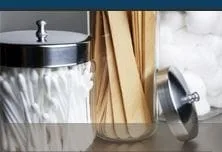Chronic Sinus Problems
Chronic rhinosinusitis is an inflammatory condition involving the nose and paranasal sinuses, with symptoms persisting for 12 weeks or longer. Common symptoms include facial pressure, nasal congestion, nasal drainage, and decreased sense of smell. Chronic sinus problems can result from infection, allergies, and nasal polyps obstructing the sinus openings.
We offer a variety of procedures to evaluate and treat chronic sinus problems. Nasal endoscopy can be performed in clinic on your initial visit using either a flexible fiberoptic endoscopic camera or a rigid endoscopic camera. The camera is placed into the nose to evaluate the nasal cavity and sinus passages. Results of the procedure are available in real-time and can be reviewed with you during your appointment.
Another technique for evaluating the sinuses is imaging. NorthWest ENT utilizes a low-radiation CT scanner formulated specifically for looking at the nasal and sinus anatomy. This CT scan can be done in clinic, takes only a few minutes to complete. It provides images that can be viewed immediately following the scan. The CT images can be used to assist with diagnosis and surgical planning,and can be used to provide calibrated image-guidance if surgery is indicated.
For patients with nasal polyps identified on nasal endoscopy or CT scan, we offer state of the art treatment options including the following:
Balloon Sinuplasty: Balloon sinuplasty devices are endoscopic tools that can be used either in the operating room or in some cases, in the physician’s office under local anesthesia. The balloon sinuplasty is a catheter-based device used to create a durable opening in the sinuses and assist otolaryngologists in further meeting the goals of clearing blocked sinuses, restoring normal sinus drainage and function, and preserving normal anatomy and mucosal tissue. The procedure is performed by passing a flexible guidewire into the blocked sinus. Then a balloon is advanced over the guidewire and is inflated to gently expand the sinus opening.
 PROPEL Sinus Stent: PROPEL represents a medical
breakthrough clinically proven to improve surgical outcomes for
chronic sinus sufferers. PROPEL is the first and only device
clinically shown to keep the sinuses open after surgery, precisely
deliver anti-inflammatory medication directly into the healing
tissues, and then dissolve. The innovative sinus stent decreases
postoperative scarring and inflammation, reducing the need for
additional surgical procedures as well as oral steroids and their
potential side effects. At the same time, PROPEL’s spring-like,
lightweight design means patients usually can not even tell it is
there.
PROPEL Sinus Stent: PROPEL represents a medical
breakthrough clinically proven to improve surgical outcomes for
chronic sinus sufferers. PROPEL is the first and only device
clinically shown to keep the sinuses open after surgery, precisely
deliver anti-inflammatory medication directly into the healing
tissues, and then dissolve. The innovative sinus stent decreases
postoperative scarring and inflammation, reducing the need for
additional surgical procedures as well as oral steroids and their
potential side effects. At the same time, PROPEL’s spring-like,
lightweight design means patients usually can not even tell it is
there.
 SINUVA (mometasone furoate) sinus implant: Dr.
Varela offers a non-surgical procedure for patients who suffer from
repeat nasal polyps with SUNIVA (mometasone furoate) sinus implant.
SINUVA is proven to reduce polyps, nasal congestion. and
obstruction. SINUVA is a sinus implant that treats nasal polyps
without surgery. During a routine office, Dr. Varela will use
topical and/or local anesthesia to numb the nose and sinuses.
SINUVA is then placed into the sinus cavity through the nasal
opening. SINUVA’s design provides 2-in-1 approach: open the sinus
cavity, and release anti-inflammatory medication to treat nasal
polyps for up to 90 days. Benefits include significant reduction in
nasal obstruction and nasal congestion, and significant improvement
in impaired sense of smell.
SINUVA (mometasone furoate) sinus implant: Dr.
Varela offers a non-surgical procedure for patients who suffer from
repeat nasal polyps with SUNIVA (mometasone furoate) sinus implant.
SINUVA is proven to reduce polyps, nasal congestion. and
obstruction. SINUVA is a sinus implant that treats nasal polyps
without surgery. During a routine office, Dr. Varela will use
topical and/or local anesthesia to numb the nose and sinuses.
SINUVA is then placed into the sinus cavity through the nasal
opening. SINUVA’s design provides 2-in-1 approach: open the sinus
cavity, and release anti-inflammatory medication to treat nasal
polyps for up to 90 days. Benefits include significant reduction in
nasal obstruction and nasal congestion, and significant improvement
in impaired sense of smell.

DUPIXENT (dupilumab) injection: DUPIXENT is a
biologic medication previously used in the treatment of asthma and
atopic dermatitis, and newly approved for the treatment of chronic
rhinosinusitis with nasal polyposis (CRSwNP). DUPIXENT targets the
underlying inflammation that plays a role in CRSwNP. One benefit of
this medication is that it is not a steroid. DUPIXENT comes in a
pre-filled syringe and can be administered by patients at home. It
is administered subcutaneously once every 2 weeks.



